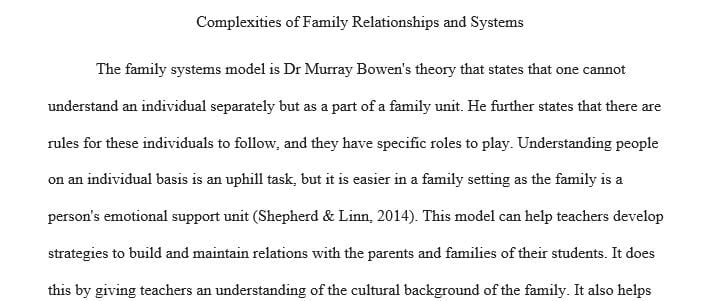Discuss the Family Systems Model and how this model can guide teachers in developing strategies for establishing collaborative relationships
Discuss the Family Systems Model and how this model can guide teachers in developing strategies for establishing collaborative relationships
You will view a video-lecture covering the major topics in the units. It is important that your comprehensive, as outlined in the Discussion Board Rubric, and meets the minimum word requirement of 250-words.
Unit 2 examined the many complexities of family relationships and systems and how these relationships and systems contribute to, or detract from, student success. You have learned that family engagement is much more influential with regard to student success than is family involvement. You have learned many of the strategies teachers can use to establish positive relationships with students’ parents and families. And, you explored the Family Systems Model and learned how an understanding of this model can help teachers establish collaborative relationships with parents and families.
Watch the Unit 2 Lecture. https://kapextmediassl-a.akamaihd.net/artsSCi/PS340/PS340_1903C/PS340_DiscussionBoard_Lecture_U2.mp4
(Read the transcript.) Is the attachment
Discussion:
Your reading assignment for this unit outlines the importance of family involvement to student success. However, the challenge for teachers is how to develop collaborative relationships with culturally diverse families.
Discuss the Family Systems Model and how this model can guide teachers in developing strategies for establishing collaborative relationships with parents and families.
Describe some of the proactive and reactive strategies that can be used to develop these collaborative relationships.
Contrast family involvement with family engagement and discuss how a teacher might encourage family engagement through communication. What impact does family engagement have on student success?
Identify the three components of academic optimism. How does academic optimism impact teacher effectiveness?
Book: Shepherd, T. L. Behavior and Classroom Management in the Multicultural Classroom
Chapter 3 in Behavior and Classroom Management in the Multicultural Classroom: Proactive, Active, and Reactive Strategies: “Collaborating with Parents and Families”
Chapter 3 examines the family and how family relationships, systems, and functions impact student success. You will discover strategies that can be used to increase family engagement in the school life of students, and how family engagement contributes to academic progress. You will also begin to explore standards of professional conduct that must be adhered to when working with students’ families.
https://www.bacb.com/about-behavior-analysis/ This can help you as well
Put this on the last page by its self.
Propose a reactive strategy that a teacher can use, that is different from any your peer suggested, to promote collaborative relationships with parents. Discuss how this reactive strategy will work to promote such collaborations.
Suggest a way that parents can encourage academic optimism in their children’s teachers. Provide an example illustrating this approach
Answer preview to discuss the Family Systems Model and how this model can guide teachers in developing strategies for establishing collaborative relationships
APA
534 words
Get instant access to the full solution from yourhomeworksolutions by clicking the purchase button below
The post Discuss the Family Systems Model and how this model can guide teachers in developing strategies for establishing collaborative relationships appeared first on Yourhomeworksolutions.
-
- Assignment status: Resolved by our Writing Team
Comments
Post a Comment